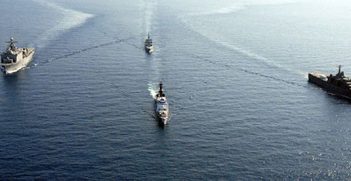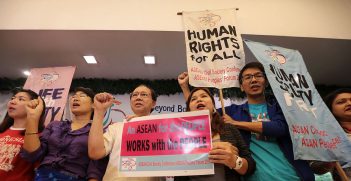Nuclear Weapon Ban: Engage or Enrage?

The Australian government’s decision to join nuclear-weapon states in boycotting negotiations for a ban on nuclear weapons adds to international divisions on the issue. Australia should instead be playing a constructive role in addressing the risk of nuclear weapons by participating in negotiations.
At the end of this month, the United Nations (UN) is holding negotiations for a treaty to prohibit nuclear weapons. Negotiating sessions are scheduled to be held from 27 March to 31 March and 15 June to 7 July, after which the UN General Assembly will review its progress and decide how to proceed.
More than 25 years after the end of the Cold War, the world still has 15,000 nuclear weapons. Although Article VI of the Nuclear Non-Proliferation Treaty (NPT) obliges the parties “to pursue negotiations in good faith on effective measures relating to cessation of the nuclear arms race at an early date and to nuclear disarmament”, today there are no plans for further weapon reductions, let alone elimination. Indeed, there is a real risk that the arms control achievements of the past will start to unravel, and the world could once again face a nuclear arms race.
This situation has led over 120 countries to call for negotiations on a treaty to ban nuclear weapons. Four of the five NPT nuclear-weapon states—the US, Russia, UK and France—oppose the negotiations and have indicated they will not participate. The fifth NPT nuclear-weapon state, China, abstained in the General Assembly vote for the negotiations, but has since reiterated its commitment to nuclear disarmament. Of the four nuclear-armed countries outside the NPT, Israel opposed negotiations, India and Pakistan abstained, and North Korea supported negotiations. At this stage it is not known if China, India and Pakistan will participate in the negotiations.
It appears the US has lobbied its allies against the negotiations. The Australian government has announced it will not participate. Foreign Minister Julie Bishop has rejected the ban proposal, saying “we must engage, not enrage nuclear countries”. But these negotiations are an attempt to engage the nuclear-weapon states on an issue that is strongly felt around the world, namely the continuing danger of nuclear war. The countries seeking negotiations, almost two thirds of the international community, are entitled to have their concerns treated with respect. The refusal of the nuclear-weapon states and others to engage in negotiations is provocative and will add to tensions within the NPT membership.
In a recent Senate Estimates hearing, officials of the Department of Foreign Affairs and Trade (DFAT) were asked whether a boycott of the negotiations would breach Australia’s NPT obligation to pursue negotiations for nuclear disarmament. DFAT said its legal advice was this is not the case. Reasons given for not participating were, that “we do not believe it is in Australia’s national interests”, “we do not believe that it will affect disarmament” and, surprisingly, “we would not be able to negotiate in good faith”.
All sides should engage to find common ground
For the nuclear-weapon states and their supporters to refuse to engage raises questions about their commitment to NPT Article VI. A boycott will damage relations within the NPT, ensuring an unfavourable atmosphere for the next NPT Review Conference in 2020. There is also the possibility that the ban’s proponents may proceed with a treaty regardless of the absence of the nuclear-weapon states. This would result in an unrealistic treaty and would set back the cause for a ban, an outcome that is in no-one’s interest. All countries should participate to ensure a full discussion and a realistic outcome.
It is not possible at this stage to assert that a ban would be unrealistic or ineffective, because the substance of the ban has yet to be negotiated. This is the point of having negotiations and why participation by both sides is essential. A ban requiring the elimination of nuclear weapons by a specific date would not be accepted by the nuclear-weapon states, but there is no reason to believe such an unrealistic proposal would emerge if the negotiations are inclusive.
In a paper recently published by the Asia Pacific Leadership Network I suggest the two sides may be able to find common ground, for example a ban on use of nuclear weapons or on the first use of nuclear weapons. A ban of this kind is not far removed from existing doctrines of no first use, or sole purpose. That is, that the sole purpose of nuclear weapons is to deter their use by others. A more limited ban will not appeal to all ban proponents, but a ban of this kind would be an important achievement, and would prepare the ground for further commitments.
Arguments that a ban treaty would be ineffective, unverifiable or unenforceable misunderstand the nature of international agreements of this kind. While taking the form of a legally binding treaty, it will primarily be a political commitment. The treaty will have force because the parties conclude that observing it serves their national interest and violating it does not. The bottom line is that nuclear deterrence will continue to apply: while nuclear retaliation is considered incompatible with a ban on nuclear use, in the real world the likelihood of nuclear retaliation—which underpins nuclear deterrence—will remain a dominant factor while nuclear weapons exist.
One issue clearly on the minds of US allies is whether a ban can be consistent with extended nuclear deterrence or the US ‘nuclear umbrella’. Some may be concerned that they would have to renounce extended nuclear deterrence. This does not follow: regardless of how a ban is expressed, nuclear deterrence will remain a reality until nuclear weapons are finally eliminated.
A ban will re-energise the commitment to disarmament
The greatest value of a ban, if the negotiations succeed, will be in shifting away from the current ‘business as usual’ attitude to delegitimising nuclear weapons and reinforcing the common goal to pursue further reductions and eventual elimination. A ban treaty will help reduce international tensions and will prompt practical steps such as taking nuclear missiles off ‘launch on warning’ alert, ending the development of new nuclear weapons and including ‘tactical’ nuclear weapons in future arms reductions. A ban would also extend disarmament commitments to the nuclear-armed countries outside the NPT.
Contrary to arguments from some nuclear-weapon states, a ban is not inconsistent with the step-by-step approach to disarmament articulated to date. A ban is not an attempt to achieve disarmament in one step. Rather, as made clear in the open-ended working group that prepared the way for these negotiations, it will strengthen the framework within which the necessary practical steps can proceed. These specific steps will include the verification needed for confidence in the disarmament process.The case for participation was put clearly by the Netherlands Foreign Minister, Bert Koenders, in a statement to the UN Conference on Disarmament on 27 February 2017:
“This year will see the beginning of nuclear ban treaty negotiations. The Netherlands has chosen to take part constructively, with an open mind and without being naive. We will examine how and to what extent a ban can contribute to nuclear disarmament. Multilateralism will be the foundation of our efforts here, too. The purpose of a ban should be to strengthen international security and, by extension, our national security. But to meet that goal, a ban must complement the existing multilateral architecture and not weaken it. It must not intensify divisions among states. And it must include nuclear weapons possessors.”
Boycotting the ban negotiations does nothing to overcome the current inertia and is potentially damaging to the NPT. Australia should, like the Netherlands, actively engage in the negotiations to find a constructive outcome.
John Carlson AM is a non-resident fellow at the Lowy Institute. His other appointments include member of the Asia Pacific Leadership Network on Nuclear Non-Proliferation and Disarmament, and counsellor to the Nuclear Threat Initiative.
This article is published under a Creative Commons Licence. It may be republished with permission.





